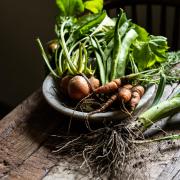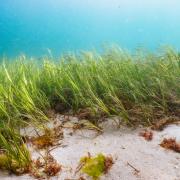It’s January, the month for new beginnings and a fresh start, so head into the new year with some eco-friendly and all-round feelgood tips and ideas
Love your leftovers
It is estimated that here in the UK we already waste nearly a quarter of all food we buy. Love Food Hate Waste has a great recipe finder to help use up your Christmas leftovers. Put in an ingredient (eg. sprouts) and you will get a list of tasty ideas save them from the compost bin. lovefoodhatewaste.com
Good smellies
The unwanted beauty gift set seems to be as much of a Christmas tradition as the office Secret Santa. Before you throw it out, consider donating it to a beauty bank instead. The Hygiene Bank and Beauty Banks both aim to redistribute unwanted toiletries to those in need. If you have any unopened toiletries or beauty items that you wish to donate, you can find drop off points in Superdrug and Boots or via their websites. thehygienebank.com, beautybanks.org.uk
January to Veganuary
Whilst committing to a vegan lifestyle might not be a permanent change that you want to make, Veganuary offers some great vegan food inspiration to try at home, and you might find that some plant based alternatives work for you long term. veganuary.com

Air the house
When it’s cold outside, it can feel natural to use draught excluders and keep windows tightly sealed to trap all the warm air in. However, opening windows for just five minutes a day can clear the build up of harmful air pollutants and allergens from things like cleaning products, cooking and woodburning stoves, and reduce humidity which can lead to harmful mould.
Buy local
Devon produce is second to none, so support local farmers by visiting one of the many farmers’ markets across the county or look for a community-supported agriculture (CSA) scheme near you. By buying locally, you reduce the carbon footprint of your food and contribute to the sustainability of our rural communities.
Switch to solids
The carbon footprint of liquid soaps is around 25 per cent higher than soap bars as they are less economical to transport, have considerably more packaging and derive from synthetic, petroleum based detergents. Switch those plastic bottles for an old-fashioned bar of soap, local soap makers; The Dartmoor Soap Company and SoapDaze both have an excellent range to suit all members of the family.

Plant power
Houseplants have been linked to lower stress levels, improved mood and increased brain power. Bring the outside in, with an air purifying plant for your home, like an easy to care for spider plant or a resilient rubber plant.
Flick that switch
By turning off devices at the plug rather than leaving them in energy draining sleep mode, you could save between seven to 13 per cent of your household electricity useage. Pay particular attention to phone and laptop chargers and unplug them when they are not in use, they are a fire risk as well as an energy guzzler.
Let the light in
The short days of winter can affect our mood, eating and sleeping patterns. Maximise the winter sun by cleaning your windows with a spray solution of equal parts water and white vinegar. Rub clean windows with scrunched up newspaper to remove all watermarks and fling those curtains wide.
Go slow fashion
Fast fashion comes at a huge human and environmental cost. The fashion industry not only produces ten per cent of all global CO2 emissions annually, but fast fashion is powered by cheap labour and an exploited workforce.
The most sustainable clothes are those you already own, so browse Pinterest for styling inspiration and local Facebook groups for talented tailors to run repairs or alterations. For a special outfit, consider a clothing rental website.
Flexi-eating
If Veganuary feels like a step too far this year or you have already slipped in your plant based diet goals then don’t be too hard on yourself. Committing to just a flexitarian diet could reduce greenhouse gas emissions by up to 52 per cent and the more meat free days you introduce, the better.
Check the labels
The so-called ‘dirty dozen’ are 12 potentially harmful ingredients in skincare and beauty products and include parabens and phthalates. Learning to identify and avoid these harmful chemicals is a good step towards safer and more eco-friendly personal care choices.
Switch your sponge
Most kitchen sponges are made from plastic. They contain polyurethane made from petroleum which is responsible for a third of global carbon emissions. Make the switch to a compostable sponge made from natural renewable cellulose and cotton ingredients that can be washed regularly with your normal laundry and composted at the end of its life.
Organise your bins
Even the most experienced and motivated recycler can get confused by what can and cannot be recycled. Organising your recycling bins can encourage the whole family to ensure recyclable items are not thrown in the general waste bin. Contact your council for up-to-date bin labels and identify where your nearest TerraCycle and soft plastic recycling points are.
Get sowing
Gardening is good for the soul and those without a garden can still reap the benefits. Research found that home gardening in a window box or pot was just as beneficial as a walk in nature. January may not be the most fruitful time in the garden, but there are things that can be grown right now like spinach and lettuce seeds which, if planted today, will make a tasty winter salad by February.
Go for green
The UK is now generating nearly half of its energy from renewable sources, and supporting green energy providers can fund even more projects away from fossil fuels. Green energy is no longer the expensive option either, with green tariffs at competitive prices.
Label watch
The Wold Wide Fund for Nature (WWF) estimates that palm oil is now found in 50 per cent of packaged products in our supermarkets, from food to beauty products. This is down to its versatility and efficiency as a crop, but its success has brought deforestation and a loss of habitat of endangered species. WWF believes that instead of boycotting palm oil, consumers should look for RSPO (Roundtable of Sustainable Palm Oil) certified products instead.
Sleep naturally
We spend a third of our lives asleep yet our beds may be exposing us to harmful chemicals every night. There have been concerns that flame retardants added to mattresses and volatile organic compounds in polyurethane could be released during the night and affect health. Organic mattresses made from wool, cotton and latex offer a clean and comfortable night's sleep.

Use a milkman
Support local farms and businesses and help the environment by using a local milk delivery service. Milk can be supplied in glass bottles that can be refilled to reduce plastic waste. Go a step further and choose organic milk where you can.
Get temperature savvy
We have all been looking to reduce our fuel bills this winter. Rather than leaving radiators on low all day which is inefficient, set your home thermostat to a recommended 18oC at night and 19-21oC during the day for occupied rooms.
Focus on the good
If you are feeling a little overwhelmed by eco-anxiety or just knowing where to start, focusing on actionable steps can make a positive impact. By educating ourselves about the environment, engaging in eco-friendly practices like recycling and reducing waste, and supporting green initiatives, we regain a sense of control. Connecting with like-minded individuals and participating in local conservation efforts can also help alleviate anxiety.
Take off shoes
Etiquette aside, there are sustainability reasons to leave your shoes at the door. Tracking dirty shoes through a house means that cleaning is likely to be more regular and more intensive, which both increases the use of potentially toxic cleaners and reduces the longevity of flooring. Bare feet or slippers are softer on carpet fibres and can keep them looking fresher for longer.
Get planning
Your foodprint is the environmental impact of growing, processing and transporting the food that you buy. You can reduce your foodprint and combat food waste by weekly meal planning. Get the whole family involved in picking recipes and buy just what you need.

Nice nappies
It is estimated that a baby will go through an average 146.5kg of disposable nappies by the time they are two and a half. These can take up to 500 years to break down leaving microplastics in their wake. Reusable cloth nappies are no longer the fiddly, cumbersome options that they once were and can be borrowed from a nappy library, find your nearest with the UK Nappy Network.
Bank ethically
Ensure that your money is not financing fossil fuels, the oil and gas industry and the arms trade by switching to an ethical bank. You can view the ethical rankings of all UK banks on the Ethical Consumer website. ethicalconsumer.org
Wrap not cling
If you still use cling film, then now is the time to make the change from this plastic peril. Aside from the concerns about harmful chemicals from cling film leaching into the food it is protecting, cling film is difficult to recycle and releases a toxic chemical called dioxin when thrown in landfill. Switch to reusable beeswax or vegan food wraps that are fully recyclable and biodegradable.
Ditch those toxins
There has been a boom in sales of cleaning products with bleach and highly scented laundry detergents topping the list. As well as ending up in our waterways and posing a threat to wildlife, this increased toxic load in your house could lead to negative health effects with hormone disrupting phthalates, volatile organic compounds and chemical skin irritants all present in common household cleaners. Clean a gentler way with natural products that you can make at home. Find inspiration online.

Compost at home
If you have any outdoor space then you can discover the joys of home composting. The simple rule of thumb is that, if a food is raw and vegan, then it can be composted, the exception being egg shells which will add useful minerals to your soil.
Inbox clean-up
Our online habits are estimated to contribute to 3.7 per cent of global greenhouse emissions. So what steps can we take to reduce our digital footprint? Start by reducing the amount of emails you send by using Dropbox or other file sharing systems to manage documents and collaborate on work. Cut your inbox impact further by thinking before you hit send on unnecessary emails and unsubscribing from marketing emails and newsletters.
Save water
Waterwise estimates that the average person in England uses 143 litres per day. Save money and save water by claiming your free home water saving devices from South West Water.
Better together
We all need a little inspiration to keep motivated, discover new ideas and move towards a more sustainable life. It has been found that social influence is a powerful motivation for behaviour change. By continuing to demonstrate what we are doing on an individual level to be more green and sharing that with others in a non judgemental way, we can be a force for good.



























